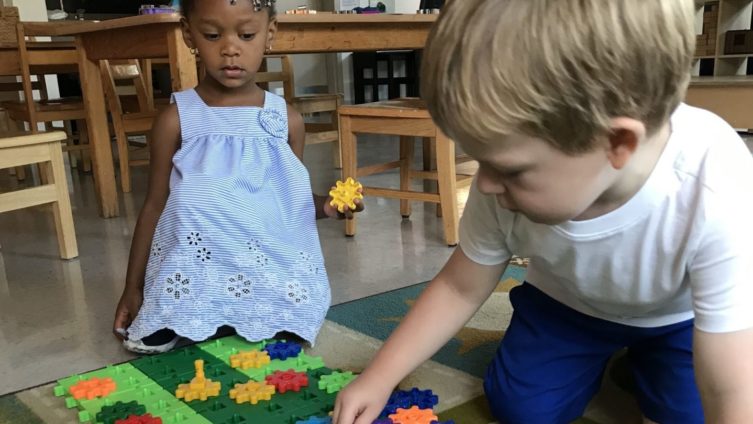
Walk into any one of TCS Atlanta’s 3’s/4’s or 4’s/5’s classrooms and you’ll see students playing with blocks, acting out characters, and turning everyday items like paper towel rolls, ribbons, and cotton balls into amazing art pieces. There’s no doubt that the children are having fun, but there’s also some serious learning happening within all this play!
“As an early childhood educator and advocate, I cannot emphasize enough the importance of play to a child,” said Emilie Brick, 3’s/4’s teacher. “Play is the way a child relates and makes sense of the world around them. Through play, children develop foundational math and reading skills, fine and gross motor skills, and, with the right support, a lifetime love of learning.”
TCS Early Learning Program teachers know that play is incredibly important to how children learn, and receive training on how to direct high-level play. When children engage in high-level play – play that involves “pretending” that lasts anywhere from 15 minutes to one hour and includes multiple roles, and symbolic use of props – they start to build abstract thinking skills which helps them make sense of letters, words, numerals and mathematical symbols.
But abstract thinking skills are just the beginning of the many skills kids pick up while playing. These include:
- Gross and fine-motor skills
- Language and communication skills
- Strong social development skills like listening, collaborating, compromising, and negotiating
- Better self confidence
Teachers and students love the simple wooden building blocks because the learning opportunities are endless. Our teachers use the blocks to connect play to lessons about sorting, math, or language. Children naturally begin to comprehend and apply concepts of math, science and engineering while they build teams, collaborate spontaneously, and think strategically, but all the kids know is that they’re having a ton of fun!
“They are the simplest toys, but the opportunities for learning and fun are endless,” said Nitefa Pearson, 4’s/5’s teacher. “Blocks can be transformed into math or language toys by adding pictures, numbers, or words to them for the children to explore. In Early Learning, children use blocks to create structures, roads, furniture or simply to sort. While playing, they not only learn to manipulate the material, they get practice working with others.”
TCS Early Learning Program teachers know how to facilitate play to achieve the high-level of engagement needed for skill building. They ask open-ended questions to encourage problem solving, use their Responsive Classroom training to make encouraging comments that build self confidence, and steer play so that it remains high-level, focused and productive.
“Play is such a natural thing for a child to do, and it is our job as adults to learn to see the benefits of play,” said Emilie. “Play is a necessary and beautiful part of life that we need to honor and treasure. We must protect a child’s right to learn through play.”









